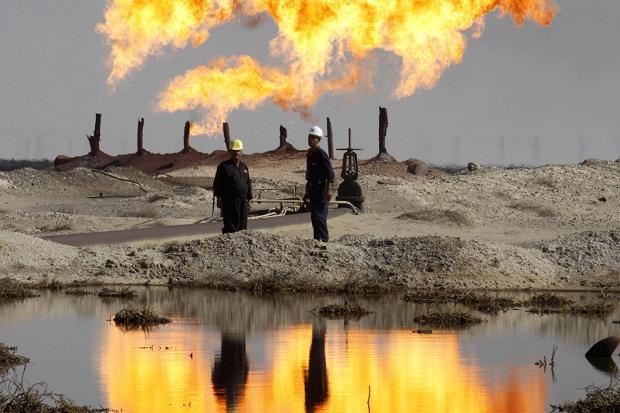
IRAQ'S OIL WILL UP

WSJ - Iraq plans to increase crude-oil exports in January, government records show, immediately raising questions about its commitment to slashing production in line with OPEC's landmark production agreement last month.
Iraq's national oil company, the State Organization for Marketing of Oil, or SOMO, has plans to increase deliveries of its Basra oil grades by about 7% to 3.53 million barrels a day compared with October levels, according to a detailed oil-shipment program viewed by The Wall Street Journal. Those oil shipments represent about 85% of Iraq's exports.
The oil shipment plan was dated Dec. 8, nine days after Iraq agreed to cut its output by more than 4% along with other members of the oil cartel, the Organization of the Petroleum Exporting Countries. OPEC, which controls over a third of global crude-oil production, said Nov. 30 that its collective output would fall by 1.2 million barrels a day beginning Jan. 1, with specific agreements from member countries.
The list of planned tanker loadings has been circulated among potential buyers so they can gauge its availability.
SOMO chief Falah al-Amri declined to comment about the company's January export levels. Iraq's oil minister, Jabbar Ali al-Luaibi, has said he would instruct SOMO to act on the OPEC output-cut agreement.
On Wednesday, several hours after a Wall Street Journal article on Iraq's oil-export plans, OPEC Secretary General Mohammad Barkindo said he planned to ask members in writing on Thursday to announce their future oil-export programs. While OPEC asks members to disclose their production, it would be unprecedented for the cartel to ask countries to announce the levels they export.
"I just thought I should write the ministers to avoid complacency," Mr. Barkindo said in an interview.
OPEC has a spotty record of complying with its production-cut agreements. A Goldman Sachs report said that, over 17 production cuts since 1982, the cartel's members reduced output by an average of 60% of the amount committed to.
Iraq agreed to cut its output by 210,000 barrels a day from October levels of 4.561 million barrels a day. The country's oil officials were among the most reluctant to go along, disputing OPEC's statistics and threatening to pull out of the agreement until the last minute because it needs the oil revenue to fight its war against Islamic State.
Iraq says it has increased its output to 4.8 million barrels a day in 2016, from less than 3 million barrels a day a few years ago, using Western and Chinese oil companies to tap into its deep crude reserves.
A country's oil exports and its crude-production levels don't always rise and fall together because some oil production is consumed locally and other output is stored in tanks.
In Iraq's case, though, the country consumes only about 15% of its oil production, an amount that doesn't vary much month to month. Its maximum storage capacity is just over 10 million barrels, which isn't enough to account for the increase in Basra exports.
Those numbers suggest that Iraq couldn't cut its production if it wants to meet its stated goals for export shipments in January.
The planned deliveries to mostly Indian and Chinese refiners also represent a rise of 390,000 barrels a day compared with December shipments, according the records viewed by the Journal.
Iraq's plan to increase exports comes as other OPEC members are informing their buyers that less oil—not more—is coming.
Speaking to reporters this weekend, Saudi Arabian energy minister Falih al-Khalid said state-run Saudi Aramco had notified customers that it will reduce deliveries despite high demand for its oil in January. OPEC members Qatar, Angola and Algeria have also told crude-oil buyers like refineries that they will be reducing deliveries.
In Russia, a non-OPEC producer that joined the cartel's efforts to pull back output, Energy Minister Alexander Novak said on Wednesday that 12 companies that produce about 90% of the country's oil have pledged to uphold a production cut, according to Interfax news agency. Russia is among 11 non-OPEC producers that agreed to cuts along with OPEC.
"They will lower [output] proportionally to production volume," he said.
OPEC has set up a five-member committee to monitor countries' compliance with their pledges to cut. The committee will include OPEC members Kuwait, Algeria and Venezuela and Russia and Oman from outside the cartel representing the 11 non-OPEC producers that also promised output cuts.
-----
Earlier:




